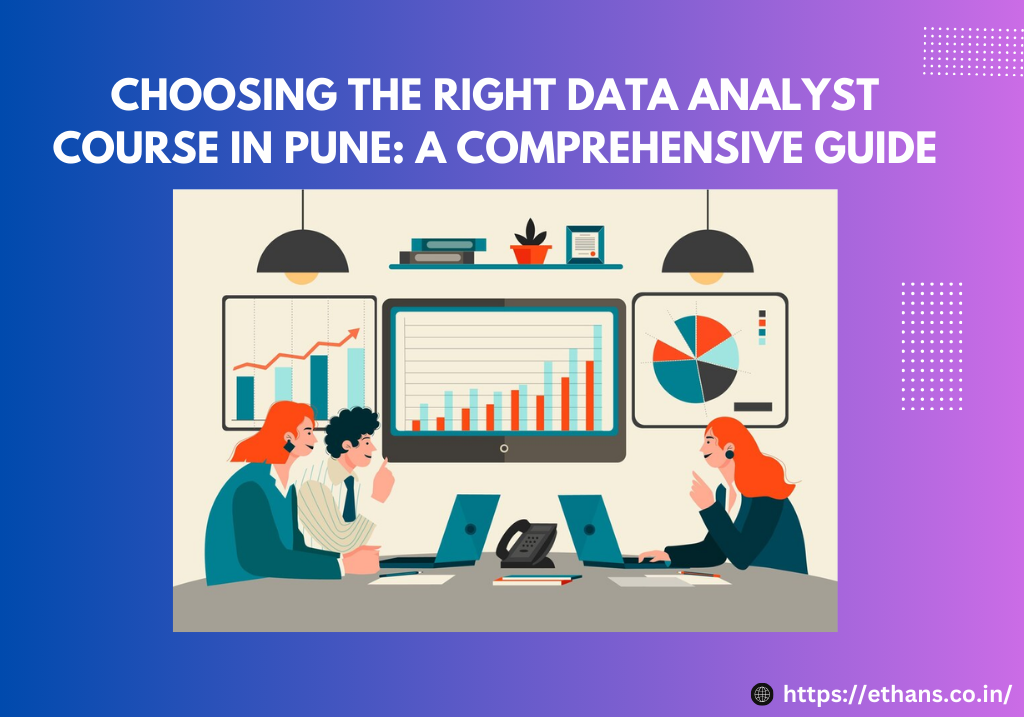Given the increasing focus on big data trading in the modern world, the position of a data analyst is more valuable than ever. Perfectly synchronized with the rise of big data usage in organizations, the need for skilled data analysts also remains extremely high. Pune, known as the Oxford of the East, has modernized its infrastructure concerning education and IT industries, and therefore, proves as an integral city for establishing one’s career in the field of data analytics. This guide will help you to understand the process for choosing the right data analyst course in Pune:
The Overview of the Data Analyst Profession
To narrow down to courses, one should first know what a data analyst does. A data analyst is responsible for the management and manipulation of big data as well as statistical analysis. Organizations mainly rely on them to make decisions that are based on different forms of data. Typical responsibilities include:
Data Cleaning: Similar to data accuracy, data quality may involve eliminating any inaccuracy with the data, to make it informed and accurate.
Data Visualization: Secondary data analysis work such as making charts and graphs to illustrate analysis findings.
Statistical Analysis: Statistical analysis is a process of identification and interpretation of data patterns.
Reporting: Conclusions made and information shared with the relevant authorities.
Why Pune for Data Analytics?
Today Pune has many educational institutions that make it popular and a flourishing IT hub. The city provides a combination of a great educational background and numerous jobs in the context of the data analyst profession, which is suitable for the desires of aspirants. learning institutions such as training centers, universities and technology firms hence making Pune a suitable learning ground.
Guidelines for Selecting a Data Analyst Course in Pune
1. Course Curriculum
The curriculum is the framework on which the implementation of any educational program takes place. When selecting a data analyst course in Pune, ensure that the curriculum covers essential topics such as:
- Data Cleaning and Preparation: Discover methods and techniques of data cleaning and data preparation for analysis.
- Statistical Analysis: Acquire sound knowledge of statistics which is indispensable while performing the data analysis.
- Data Visualization: For data visualization use master tools such as Tableau, Power BI, and Excel among others.
- Programming Languages: Know Python, R and SQL languages that are used in data analysis.
- Machine Learning Basics: Explain the basics of Machine learning in big data analytics as one of the expanding areas.
- Real-World Projects: Make sure that the course is working with the case study, and that some projects would involve you in the practical application of what was learned.
Therefore, by pursuing a balanced curriculum, you shall be well prepared for the elements necessary to pursue a career in Data analysis.
For instance, a course that prescribes a project in which you examine a real company’s dataset offers an experience that closely relates to a job position.
2. Accreditation and Certification
Accreditation gives credibility to the course in question and assures people that it meets the required standards. In this case, one should look for certified courses from well-known organizations including the All India Council for Technical Education (AICTE) or represent collaboration with industry experts.
Moreover, specialized certification from known organizations will expand the list of occupations and create more favourable conditions for employment. Depending on the nature of their work within an organization, certifications offered by Microsoft SAS or Google can be hugely advantageous. It is usually accompanied by the need to sit for tough tests, which show your competence to any employer.
3. Experienced Instructors
Teachers play a crucial role in one’s learning; therefore, it is of paramount importance that a convincing reason be proffered as to why the preparation of teachers should be accorded the highest priority. Check on the qualifications of the instructors before hiring them; make sure that they have some practice in the industry and that they are academically qualified. Professionals can bring some experience which can help in solving problems, and what is more important, could not be described in any books.
For example, a lecturer who has been practising for several years as a data analyst is likely to showcase real-life problems to solve hence preparing you for the market.
4. Learning Format
Data analyst courses in Pune are provided in various formats, which include full-time, part-time and hybrid models. Choose a layout that fits your timetable and studying style. For running experts, element-time or online publications might be more suitable, even as complete-time courses are perfect for folks who can commit to extensive studying.
- Full-time Programs
Such courses are full-time and enable one to achieve his or her training within the shortest time possible. They are suitable for students who are capable of dedicating their time to study without any hindrance.
- Part-time and Online Programs
These are intended for working adult students who require flexibility to pursue their education. They enable you to study on your timeline and convenience and do away with physical classes.
5. Hands-On Experience
It is said and has been seen that practical experience is very important when it comes to data analytics. More specifically, it may be important to search for courses that involve internships, projects or the practical part of a course.
For instance, having an internship experience in a course can expose you to the market and equip you with the necessary toolkit.
6. Industry Connections
Industry linkages enable institutions to secure better employment opportunities for their graduates than other institutions. Ensure the course offered comes with services like; resume writing, interviewing, and job placements. Information from guest speakers and networking dinners may also help. An Institute which has tie-ups with top-notch companies for placements can increase your probability of getting a nice placement once you complete the course.
7. Student Reviews and Testimonials
First, find out what other former students have to say about the course. Feedback to be obtained from the students includes the experiences of the learners, their testimonials, and the value of the course among other aspects. Such sites as Google Reviews, Linked In or educational forums could be useful. If alumni have reported a positive experience about their career advancement, then it can be concluded that the course might prepare students as per the corporate standards.
Conclusion
Therefore, the criteria that can help to choose the best data analyst course in Pune are curriculum, accreditation, instructor quality, and hands-on experience. Therefore, when taking this course, ensure that you do your research or ensure that the course you take relates to your dream job and you can embark on a great journey in data analytics. The educational and industrial density of Pune contributes to the range of avenues available for developing one’s career as a data analyst.
Investing time in deciding on the proper course can pay off in the end, equipping you with the skills and expertise needed to thrive within the dynamic subject of facts analytics. Remember to leverage every possibility for sensible enjoyment and stay engaged with the industry to maximize your studying and career possibilities such as the Data Analyst course by Ethans Tech.





